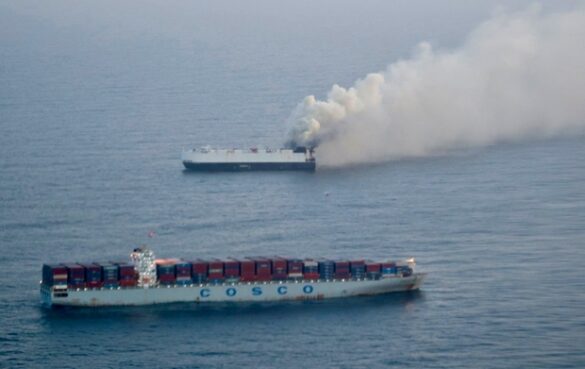A large cargo ship named Morning Midas, carrying approximately 3,000 vehicles—including around 800 electric vehicles (EVs)—caught fire and later sank in the Pacific Ocean in June 2025. The crew of 22 abandoned ship after the fire, fueled in part by lithium-ion batteries, proved difficult to control. Rescued without injury, the crew’s escape preceded the vessel’s sinking nearly three weeks later, raising significant safety and environmental concerns about transporting EVs and hazardous fuels by sea.
Incident Overview and Timeline
On June 10, 2025, the Morning Midas, a large cargo vessel transporting approximately 3,000 vehicles from Japan to the west coast of the United States, experienced a fire outbreak in the Pacific Ocean. Among the cargo were around 800 electric vehicles (EVs), whose lithium-ion batteries significantly contributed to the intensity and persistence of the fire. The crew of 22 members initiated evacuation protocols after fighting the fire proved unmanageable. All crew members were subsequently rescued by nearby vessels without sustaining injuries.
Despite firefighting efforts and containment attempts, the fire continued to smolder within the ship’s hold. Nearly three weeks later, on June 28, 2025, the Morning Midas sank entirely in the Pacific Ocean. The exact causative factors leading to the sinking are under investigation, with the protracted fire damage considered a significant contributor.
Safety Challenges of Transporting Electric Vehicles
The incident has prompted renewed scrutiny over the transportation of electric vehicles by sea, particularly concerning the risks posed by lithium-ion batteries. These batteries are known for their high energy density but also for the potential to catch fire and resist traditional firefighting methods once ignited. The fire aboard the Morning Midas highlighted the difficulties in managing such hazardous cargo in maritime environments.
Experts have emphasized the need for updated safety regulations and improved fire suppression systems capable of effectively addressing lithium-ion battery fires on cargo vessels. Additionally, the evacuation success of the crew was credited to maritime safety protocols, although the overall incident underscores the vulnerabilities involved in carrying hazardous cargo.
Environmental Concerns and Response Efforts
The sinking of the Morning Midas poses significant environmental risks, notably the potential release of pollutants from both the vehicles and the ship’s fuel reserves. Concerns include contamination from spilled diesel fuel, battery chemicals, and other hazardous materials transported aboard the vessel.
International oceanic and environmental agencies have coordinated efforts to monitor the sinking site and assess potential ecological impacts. Surveillance includes water quality testing and marine life assessments to detect early signs of environmental degradation. Cleanup initiatives and long-term monitoring are expected to continue as officials evaluate the extent of pollution and develop mitigation strategies.
Regulatory and Industry Implications
In the aftermath of the Morning Midas incident, maritime regulators and industry stakeholders are reviewing current standards for the carriage of electric vehicles and lithium-ion batteries. The International Maritime Organization (IMO) is expected to consider recommendations for enhanced safety protocols, including packaging requirements, segregation of hazardous cargo, and emergency response improvements.
Shipping companies carrying EVs may face increased insurance premiums and stricter operational guidelines aimed at reducing fire risks. This event also fuels broader discussions on sustainable and safe transportation methods for emerging vehicle technologies.
Conclusion
The fire and subsequent sinking of the Morning Midas underscore the complex challenges involved in maritime transport of electric vehicles and other hazardous materials. While no human injuries were reported, the incident raises critical issues about fire safety, environmental protection, and regulatory oversight in an evolving transportation landscape. Ongoing investigations and policy reviews will be key to preventing similar incidents and ensuring safer seas in the future.
The incident involving the Morning Midas serves as a pivotal reminder of the inherent risks associated with transporting electric vehicles and their lithium-ion batteries by sea. The fire and eventual sinking highlight significant gaps in current safety measures and environmental safeguards, prompting urgent calls for enhanced regulations and improved firefighting technologies. As investigations continue, the maritime industry and regulatory bodies face the crucial task of adapting to the evolving challenges posed by new vehicle technologies. Ensuring robust safety protocols and comprehensive environmental monitoring will be essential to safeguarding human lives, marine ecosystems, and the integrity of global shipping operations going forward.

